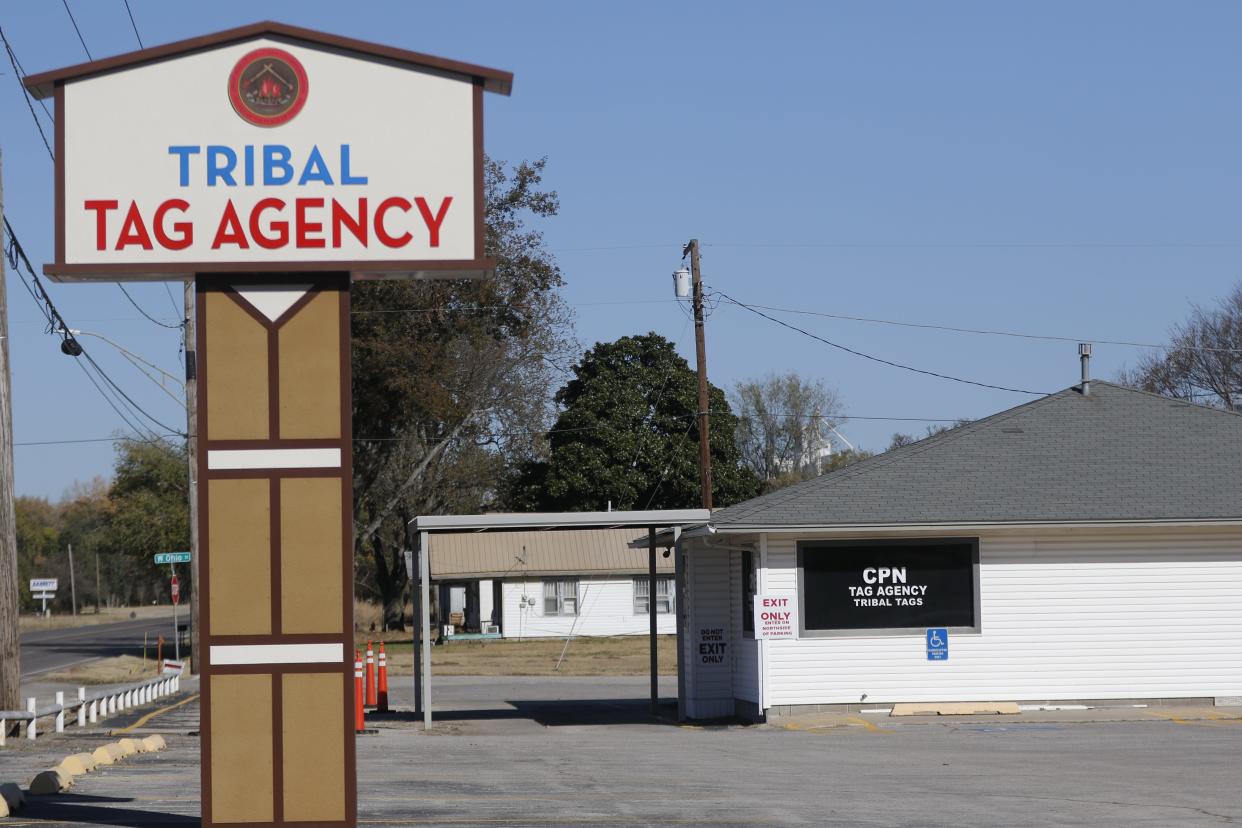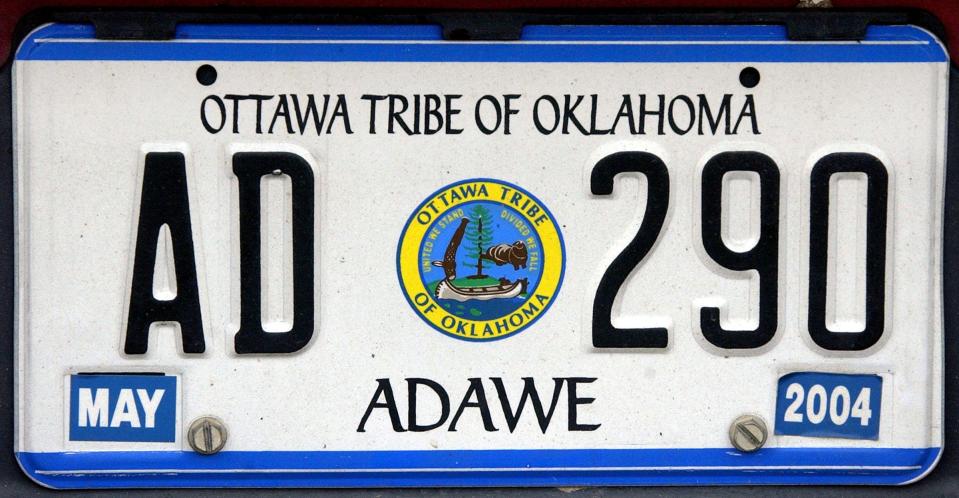'Why now?' Oklahoma tribal leaders look for answers amid confusion, fear over state car tag policy

- Oops!Something went wrong.Please try again later.
Randle Carter has driven with a red and white Sac and Fox Nation license plate for years. But after state police recently insisted drivers with tribal plates must live within their tribe’s boundaries — a startling pivot to the accepted rules of the road in Oklahoma — Carter is among tribal leaders and citizens suddenly wondering what they would do if they were pulled over.
Carter, principal chief of the Sac and Fox Nation, figures he would hand over his vehicle registration. Then he would leave it to the trooper to confirm whether or not he lives in Indian Country.
“How do they determine that? What kind of information are they providing officers?” he asked. “I don’t know.”
State police have already ticketed at least two motorists because they said the drivers lived outside of their tribal boundaries. The apparent shift in policy has shattered already-frigid relations between many tribal leaders and Gov. Kevin Stitt.
“We have tribal members right now that are afraid to drive to work. Afraid to drive to doctors’ appointments,” said Jacob Keyes, chairman of the Iowa Tribe in Perkins. “They’re just afraid.”
While the governor has denied he directed troopers to ticket drivers for tribal tags, he has supported the enforcement effort as a way to “back the blue.”
Tribal leaders received no warning on tribal tag tickets — and no communication from Gov. Stitt's office since
Carter, Keyes and other elected tribal officials said they didn’t receive a heads-up before troopers started issuing the citations and haven’t heard from the governor in the 10 days since the tickets came to widespread light.
The controversy has sparked confusion, frustration and days of meetings among tribal leaders and their legal advisers over how to move forward before Oklahoma starts impounding tribal members’ cars over unpaid taxes, something that has happened in the past. Many tribal officials have asked citizens to alert them to any tickets and have sent out reminders to follow all traffic laws, because a tribal tag alone is not probable cause for a driver to be stopped. They also have called on Attorney General Gentner Drummond to weigh in, which he reportedly plans to do.
More: Most tribes provide vehicle and license plate data to Oklahoma, state records show
“The tribes are trying to formulate a plan for everybody to get together and try to find a resolution,” said Reggie Wassana, governor of the Cheyenne and Arapaho Tribes in Concho. “We’re working toward that goal to get this car tag issue resolved.”
Although every tribal nation is different, the power of moving in unison has worked before, such as in 2019, when Stitt attempted to renegotiate the central state-tribal gaming compact with little notice.

“Every time we have conflicts with him,” Keyes said, “we’re getting closer and closer.”
In a stroke of convenience, many Oklahoma tribal officials were already planning to be at the same weeklong gathering of the National Congress of American Indians in New Orleans. The event ended Friday.
Questions over what to do about tags were at the front and center of discussions there, said Brad Kills Crow, chief of the Delaware Tribe in Bartlesville. He said conversations were not only happening among Oklahoma leaders, but among elected officials representing tribal nations across the United States, who have reacted with a mixture of shock and disbelief.
“The majority of other tribal leaders from other states are very appalled,” Kills Crow said. “They don’t understand how it’s an issue.”
Wassana said he also took part in many of those conversations. One of the biggest questions that remains unanswered, he said, is, “Why now?”
“It hasn’t been an issue up to this point, and I don’t think there’s been anything to cause that issue,” Wassana said. “So we’re all just scratching our heads trying to figure out what is going on.”
No information on how many tickets over tribal tags have been issued so far
Another unknown is how frequently troopers are writing such tickets. One of the confirmed citations occurred after a driver was pulled over for speeding earlier this month. A trooper added a second ticket for unpaid taxes on her Otoe-Missouria plate after learning where she lived. A second stop started over a loud muffler, then ended with a ticket because of the driver’s Osage Nation tag. Both stops occurred in Garfield County.
The Oklahoma Department of Public Safety has so far declined to disclose any information about how many other tickets troopers have written, saying those numbers would only be made public through a records request, which the agency has not yet fulfilled.
The uncertainty has left tribal leaders with little information to go on as they weigh what to do.
“Unfortunately, we haven’t heard anything from the state, the governor’s office, the DPS or the Highway Patrol,” Kills Crow said. “They have yet to consult with us, meet with us or even acknowledge us.”
More: Muscogee Nation sues to stop Tulsa from prosecuting tribal citizens for traffic offenses
Carter has seen tensions over license plates flare before between the state and tribes.
In 1983, Oklahoma police impounded a car with Sac and Fox plates that Carter's father was traveling in. State officials claimed Oklahoma was owed taxes on the vehicle. The dispute escalated to the U.S. Supreme Court, which ruled in 1993 that tribal nations have the right to issue tags to citizens.
The Oklahoma Highway Patrol is now citing the 30-year-old ruling as the basis for officers’ ramped-up enforcement. A spokesperson said troopers are looking to see whether cars with tribal tags are “garaged” within the jurisdiction of the tribe that issued the plates.

“OHP is enforcing the law and keeping Oklahomans safe,” Stitt said in a statement posted Monday on social media.
Both the governor and his appointed commissioner of public safety, Tim Tipton, have described tribal tags as a public safety risk because they are not listed in the state’s vehicle license database that officers use.
However, state records show at least 26 of the 33 tribes that issue plates in Oklahoma provide vehicle information to the state. The list includes the six largest tribes in the state as well as several smaller tribal nations.
When asked whether tribal plates listed in the database would be exempt from any potential tickets, a spokesperson for the governor did not respond.
What to know about tribal compacts regarding tribal tags in Oklahoma
As a former police officer, Keyes said he understands why officers need that information on the ground. The Iowa Tribe has long shared that data with local and state authorities, he said.
He believes claims that tribes are withholding plate data stem from a separate issue — Oklahoma’s new cashless tolls on state turnpikes. The system powered on without any data for plates issued by most tribes, except the Chickasaw and Choctaw nations. It also lacked data for plates from other states and countries. As a result, it often had no way to charge those drivers, a fact that Stitt has criticized the tribes for in recent months. The Oklahoma Turnpike Authority has estimated the state stands to lose out on more than $2 million a month in unpaid fares.
“I think this is where it’s coming from,” Keyes said. “Maybe it sounds better to use public safety instead of revenue.”
On the social media platform X, formerly known as Twitter, the governor said state police do not have plate data from tribes that do not have tag compacts with the state. Only three of the state’s four largest tribes have signed such agreements: the Cherokee, Chickasaw and Choctaw nations.
A spokesperson for the Department of Public Safety said officers will not ticket vehicles with tags covered by those compacts. Kills Crow said he believes the Delaware Tribe is covered by that exemption, because it sits within the boundaries of the Cherokee Nation, and Delaware citizens receive their car tags from Cherokee Nation tag offices.
But most tribes that issue plates and share that information with the state have not signed on to a formal tag compact. While some tribal leaders may be open to negotiating those agreements, that’s not the case across the board.
More: With $60 million in flux, Oklahoma House speaker says 'permanent solution' vital for tribal compacts
Carter, of the Sac and Fox Nation in Stroud, said his tribe strictly complies with the ruling in the pivotal 1993 Supreme Court case. Citizens must live within the tribe’s central Oklahoma jurisdiction in order to receive a tag.
Compacting with the state would make no sense when the tribe is expressing its sovereign right, Carter said.
“I guess the question would be if you’re not legally required to pay a tax, would you?” Carter said. “The Supreme Court answered that. It said no.”
Rep. Ken Luttrell, a Republican from Ponca City whose district includes the territories of several tribes, said some tribal leaders have expressed concerns that they would no longer be able to afford running their tag offices if they had to share any funding with the state.
“Some of the smaller tribes depend on the sale and registration of tags as part of that tribe’s income to provide essential services,” said Luttrell, a Cherokee citizen who leads the House Native American caucus.
Luttrell said some people are also worried about “spillover effects” on other agreements with the state, such as compacts that cover tobacco and gas taxes. The governor also has said he wants to bring sports betting to the state, which would require sign-off from tribes under the terms of central gaming compact.
Wassana, of the Cheyenne and Arapaho Tribes, said he believes some of those issues may be underlying the new policy on car tags. Stitt should bring tribal leaders to the table so they can work through disputes so tribal citizens do not have to worry about being ticketed for their plates, Wassana said.
“We need to come to some kind of resolution and stop all this nonsense of basically harassing tribal people,” he said.
Editor's note: This story has been updated to add more clarity about the launch of cashless tolls.
Contributing: Staff reporter M. Scott Carter
This article originally appeared on Oklahoman: Oklahoma tribal tags tickets leave confusion, few solutions

